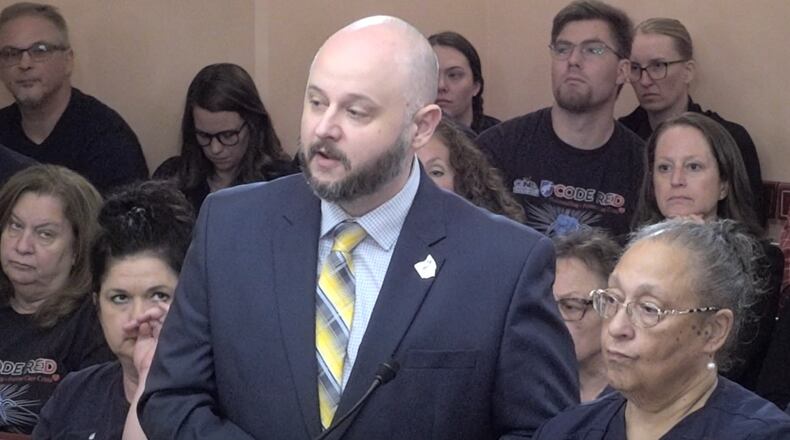The current proposed legislation in H.B. 452 would require hospitals to establish a security plan for preventing workplace violence and managing aggressive behaviors. The plans would need to be submitted to the Ohio Department of Health and be reviewed and evaluated annually.
In addition, the bill would require hospitals to form a workplace violence incident reporting system, as well as to post a notice that aggressive behavior would not be tolerated.
This week, the Ohio Nurses Association asked the Public Health Policy Committee to amend that bill to include harsher penalties for incidents where bodily fluids are used as weapons, making those actions a fifth-degree felony.
“These actions are not just violent. They pose severe health risks, including the transmission of infectious diseases,” Lucas said.
State Rep. Beth Liston, D-Dublin, ranking member of the Ohio House Public Health Policy Committee, questioned how increasing the severity of charges might impact patients who might have dementia or a severe mental illness preventing them from knowing what they are doing.
“I really struggle with saying an elderly demented or delirious person who’s critically ill should be charged with a felony for lashing out when strapped down,” Liston said.
The increased penalties wouldn’t be used universally, Lucas and Jacinta Tucker, another representative of the Ohio Nurses Association, said.
“I don’t know any nurse with a dementia person would file charges on that dementia person because that is part of dementia,” Tucker said.
There was more blame put on family members rather than patients.
“It’s when family members come in and they want everything done for that patient and you’re in that room and then all of a sudden that patient’s family is the one kicking, cussing, pushing, shoving,” Tucker said.
The goal of the increased penalties would be to file charges against and deter people who willfully commit those acts, Lucas said.
Doctors also testified in favor of H.B. 452, particularly in regard to the provisions requiring hospitals to have safety plans in place, as well as establish a workplace violence incident reporting system.
One doctor detailed an assault he suffered from a patient in February 2023, which has since resulted in multiple surgeries and physical therapy to try to correct the damage that was done his hand and wrist.
The patient had been brought in after an accident, when she suddenly kicked at the doctor and knocked him off balance, said Dr. Craig Bates, a practicing emergency physician in northeast Ohio.
“I was concerned about striking my head on the sink behind me. I reached backwards with my left hand trying to stop that from happening. I ended up on the ground with my left wrist bent over backwards in my effort to stop my fall. It swelled up quickly, and my hand was becoming numb,” Bates said.
Bates since has struggled with regaining all of the abilities he had prior to that assault, including the technical skills needed to be a doctor, and he still does not know if he will be able to regain full function of his wrist.
“Facing the possibility of never again doing the work I love hit me like a ton of bricks,” Bates said.
Bates compared it to a quarterback who suffers a career-ending arm injury.
“Maybe you can join the coaching staff, but we all know it’s not the same. You’ve worked hard and sacrificed years of your life to be quarterback, and it has been taken away from you. That is how I feel,” Bates said.
Bates’ employer was supportive, he said, submitting the inicident to a disruptive patient review board that allowed the hospital to put a plan in place to protect other hospital workers while still being able to give the patient care. The patient also went on to be prosecuted and was found guilty of a third-degree felony, he said.
Bates’ employer also put in additional safety measures after the incident, including adding police dogs and more aggressive screening of visitors and patients for weapons.
“I am hopeful that even more changes will happen to help keep us all safer,” Bates said.
This was the second hearing of the H.B. 452 before the Public Health Policy Committee.
About the Author

